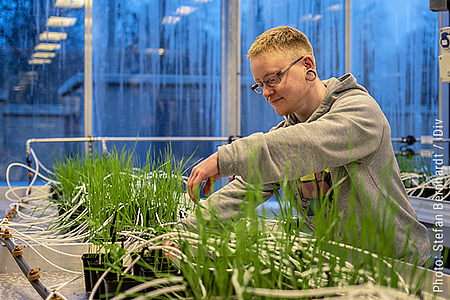Research platforms and Networks
iDiv researchers work on a variety of experimental and observational as well as virtual platforms to produce cutting-edge integrative biodiversity science. They are complemented by a range of science services and science-policy activities. Some platforms are hosted by and budgeted from within iDiv, others are hosted by institutions of the iDiv consortium.
All platforms and networks
Experimental and Observational Platforms
iDiv Support Units (SU) and Strategic Projects (SP)
AquaDiva
AquaDiva
The CRC 1076 AquaDiva, which is funded by the German Research Foundation, started in 2013 and focusses on the role of water and biodiversity for shaping the structure, properties, and functions of the subsurface. Using karstic limestone aquifers in the Hainich region in Thuringia as a model system, a team of researchers from the fields of biology, geology, chemistry, and hydrology apply analytical approaches ranging from „omics“ to isotopes and biomarkers, using a combination of complementary field, laboratory and modeling investigations to span the relevant spatial scales.
kirsten.kuesel@uni-jena.de
ARBOfun
The arboretum serves two functions: science and environmental education. The arboretum provides the unique opportunity to investigate diversity effects of 100 woody species in one single area under the same environmental conditions. And it also allows the perception of morphological, anatomical and physiological differences between various species for pupils, students and other interested persons.
cwirth@idiv.de
BEF-China
The Biodiversity Ecosystem Functioning Experiment BEF-China is the first BEF forest experiment in the highly species-rich subtropics. Established on a total area of 50 ha with more than 400 000 trees and shrubs planted it is currently the largest forest experimental platform worldwide. The main goal is determining the role of tree and shrub species diversity for production, element cycling and species conservation in Chinese subtropical forest ecosystems.
helge.bruelheide@botanik.uni-halle.de
Biodiversity Exploratories
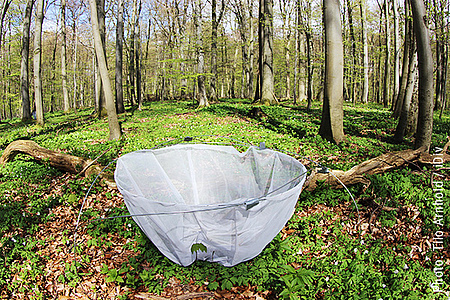
Biodiversity Exploratories
The Biodiversity Exploratories are a DFG-funded research project. The three exploratories serve as open research platform for all biodiversity and ecosystem research groups of Germany.
birgitta.koenig-ries@uni-jena.de
iDiv Ecotron (SU)
iDiv Ecotron (SU)
The iDiv Ecotron is a joint research platform of iDiv and the UFZ. The indoor research facility houses 24 identical experimental units, the so-called EcoUnits, each of which can contain one to four independent ecosystems, separated above- or belowground, or both. The main objective of the iDiv Ecotron is to manipulate multitrophic diversity in above-belowground food webs and study the consequences for many ecosystem functions.
nico.eisenhauer@idiv.de

eLTER
eLTER H2020 is a major project that will help advance the development of European Long-Term Ecosystem Research infrastructures. The overall aim of the eLTER H2020 project is to advance the European network of Long-Term Ecosystem Research sites and socio-ecological research platforms to provide highest quality services for multiple use of a distributed research infrastructure.
ingolf.kuehn@ufz.de
GCEF
The Global Change Experimental Facility is the first experiment which investigates the consequences of climate change on ecosystem processes in different land-use types on large field plots. The facility was established as part of the field research station of the Helmholtz Centre for Environmental Research in Bad Lauchstädt in 2013. The manipulation of climate and the establishment of land-use types (different grasslands and crop fields) started in 2014.
martin.schaedler@ufz.de
iDiv Greenhouse
The Jena Experiment
The Jena Experiment funded by the German Research Foundation (DFG) started in 2002 and is one of the longest running biodiversity experiments in Europe. The experiment comprises more than 400 grassland research plots on a 10 ha field site. For the main experiment, plant communities of 1 to 60 plant species and 1 to 4 plant functional groups were established. The coordinated investigation of above-ground and below-ground consumers and processes includes a full quantification of the most important element cycles, which will be used to unravel the mechanisms underlying biodiversity effects on ecosystem functioning.
nico.eisenhauer@idiv.de
Leipzig Canopy Crane (SU)
Leipzig Canopy Crane (SU)
The crane has a height of 35m and a jib length of 40m. It moves on tracks over a distance of 120m and with this covers an area of 1.6ha. The Leipzig Canopy Crane platform provides essential data sets characterising the forest microclimate conditions and forest stand structure. It is planned to develop the platform towards a high-intensity and long-term biodiversity sampling site.
cwirth@uni-leipzig.de
MyDiv
The MyDiv experiment was set up in 2015 to test the main hypothesis that tree stands with a high species richness of trees and the presence of functionally dissimilar mycorrhizal types show the highest levels of ecosystem functioning. Mycorrhizae are important beneficial interactions between plant roots and fungi that substantially contribute to the plant’s nutrition and fitness.
nico.eisenhauer@idiv.de
NutNet – NEu (SP)
The aim of the NEu project is to realise a European-focused sub-network of the Nutrient Network (NutNet) that is centred in Germany. This will be accomplished by i) developing new question-driven science initiatives that focus on regional biodiversity questions and environmental problems and ii) initiating new German and European collaborations, partnerships and funding opportunities.
stan.harpole@idiv.de
PhenObs (SP)
PhenObs (SP)
With the establishment of PhenObs – a global network of botanical gardens in 2017, a gap in knowledge was filled by monitoring and analysing different phenological stages on a large set of herbaceous wildflower species in a controlled setting. To do so, data from Botanical Gardens are collected as they offer excellent opportunities to combine the advantages of global and local scale analyses.
christine.roemermann@uni-jena.de
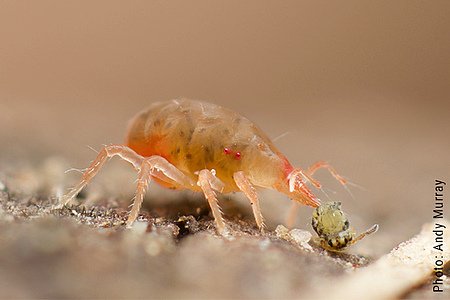
Soil BON (SP)
With the purpose of a synthesis and mobilization of available data and networks but also using standardized in-situ observation networks in combination with remote sensing data, Soil BON is a comprehensive study on the distribution, main drivers, and relationships between different facets of soil biodiversity and ecosystem functioning.
nico.eisenhauer@idiv.de
TrophinOak – PhytOakMeter
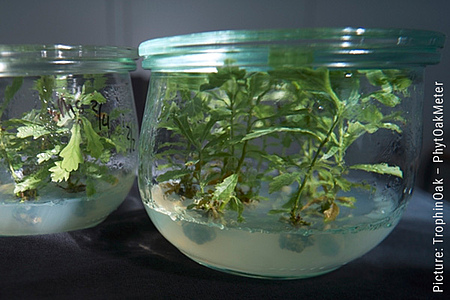
TrophinOak – PhytOakMeter
TrophinOak and PhytOakMeter focus on biotic and abiotic interactions with the clonal Oak tree DF159 under laboratory, green house and field conditions. Transcriptomic and metagenomic analyses are coupled with traits and allocation analyses in order to better understand how this important forest tree with complex multitrophic interactions can adapt under a changing environment.
sylvie.herrmann@ufz.de
Virtual Platforms
iDiv Support Units (SU) and Strategic Projects (SP)
A.P.E.S.
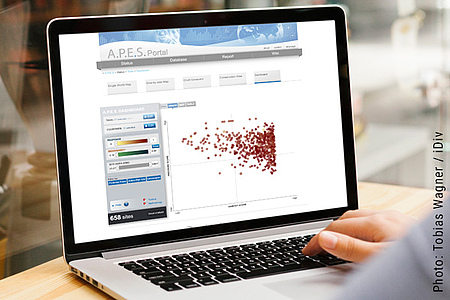
A.P.E.S.
A.P.E.S. allows to explore the geographic areas where apes still occur in the wild using interactive mapping software, to help better understand the various threats they face and to learn more about their conservation needs by using the various analytical tools provided. Of all the threats faced by apes, humans may be a large part of the problem, but we can also be the solution.
hjalmar.kuehl@idiv.de

ESDL
The Earth System Data Lab seeks to be a service to the scientific community to greatly facilitate access and exploitation of multivariate data sets in Earth Sciences.
mahecha@uni-leipzig.de
EuropaBON

EuropaBON
EuropaBON aims to design a Europe wide biodiversity monitoring system that integrates observations from multiple sources with models to produce datasets for Essential Biodiversity Variables and Essential Ecosystem Service Variables and associated knowledge tools. EuropaBON is working with stakeholders to identify user and policy needs for biodiversity monitoring and investigate the feasibility of setting up a center to coordinate monitoring activities across Europe.
henrique.pereira@idiv.de
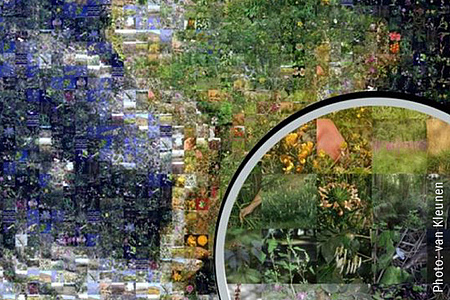
GloNAF
GloNAF (Global Naturalized Alien Flora) is a living database project about alien plant species and became a synonym for many related projects dealing with all kinds of scientific and policy relevant questions and studies about alien species (also other taxa) and related data.
marten.winter@idiv.de
GWD (SP)
The project will create the first global open-access database for woody plant demography. There is a need for harmonization of demographic methodology across ongoing projects and the development of an open access database for tree demography. GWD fills this gap and thus, has relevance for the international scientific community. In addition, the project links to international conservation efforts for the ~60,000 tree species on Earth.
tiffany.knight@idiv.de
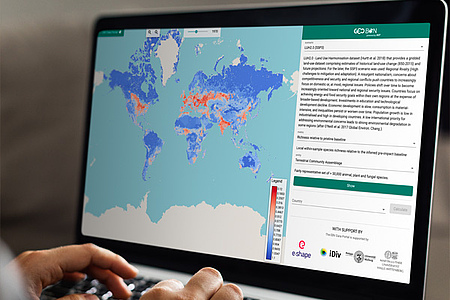
iBON (SP)
In order to make data sharing and open access publishing more common also in the ecology and conservation biology communities, iBon is designed to i) develop an interface for the research community to the Global Biodiversity Information Facility GBIF, the open biodiversity data repository BioDivBank and ii) to continue the development of the GEO BON Portal for Essential Biodiversity Variables (EBVs).
henrique.pereira@idiv.de
iUPDATE (SP)
iUPDATE (SP)
iUPDATE will initiate a long-term programme aimed at a continuously self-improving understanding of biodiversity change and its drivers via two steps: i) developing the core functionality of a longer-lasting “machine” enabling iDiv to continuously deliver highest-quality answers on biodiversity change and its drivers; ii) using this machine for national/international showcase applications, such as tracking of interacting landuse/ extreme-weather effects on biodiversity, and management-ready predicted biodiversity surfaces.
carsten.meyer@idiv.de
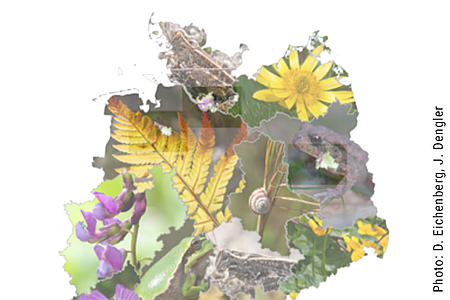
sMon (SP)
sMon is a successful transdisciplinary iDiv platform that fosters proactive dialogue on monitoring and co-created analysis of biodiversity change in Germany. The project is jointly working with experts from national and federal agencies, natural history societies, museums and NGOs as well as other research organisations.
smon@idiv.de
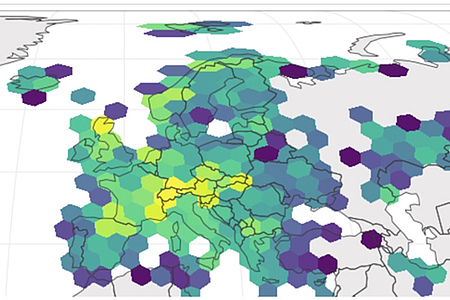
sPlot (SP)
sPlot is a collaborative initiative to integrate existing local and national vegetation-plot dataset into a global harmonised database. The overarching scientific goal is the exploration of all aspects of global plant community diversity, including taxonomic, functional and phylogenetic diversity, across biomes, vegetation types, taxonomic or functional guilds and scales.
helge.bruelheide@botanik.uni-halle.de
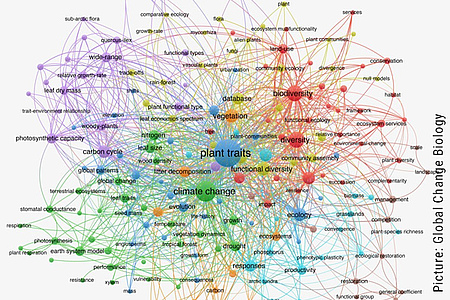
TRY
Plant traits are a key to understanding and predicting the adaptation of ecosystems in the face of biodiversity loss and global change. To improve the empirical data basis for such projections, in 2007 the TRY project was initiated. TRY is a network of vegetation scientists headed by Future Earth, the Max Planck Institute for Biogeochemistry, and an international Steering Committee.
jkattge@bgc-jena.mpg.de
Science Services
These iDiv Support Units (SU) offer laboratory and informatics capacities for all iDiv scientists
EcoMetEoR (SU)
EcoMetEoR (SU)
The aim of EcoMetEoR is to provide full access to biodiversity researchers and ecologists with instrumental infrastructure and personal expertise to implement ecometabolomic analyses in their research projects. The EcoMetEoR team supports scientists with advice on i) experimental planning, ii) sample preservation, transport and processing, iii) choice of analytical platform and extraction methods, iv) data processing and statistical analysis, v) data sharing of metabolomics.
nicole.vandam@idiv.de
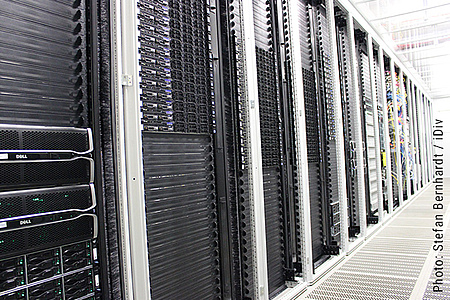
HPC Cluster (SU)
The iDiv High-Performance Computing (HPC) cluster is a large parallel computing system. It provides computational power for highly demanding tasks like large simulations or the analysis of huge amounts of data. The HPC cluster consists of powerful computers which are connected via a fast network and attached to a big shared storage system. The cluster is located at the UFZ in Leipzig and is available to all iDiv scientists.
christian.krause@idiv.de
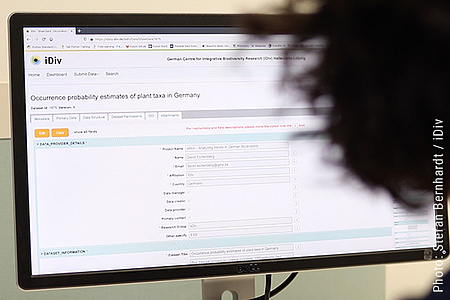
iBID (SU)
iBiD will directly support research projects of iDiv core and member groups, will enable access to the data management infrastructure and foster data and code sharing resulting in increased integration on several levels. It will contribute to educating the next generation of scientists to be data and code literate.
birgitta.koenig-ries@uni-jena.de
iCyt (SU)
The iCyt platform will facilitate utilisation of existing infrastructure to support different kinds of research projects within iDiv. Two existing flow cytometers (FCM) and a cell counter will support iDiv researchers when they need to describe various structural properties of cells in suspensions.
stan.harpole@idiv.de
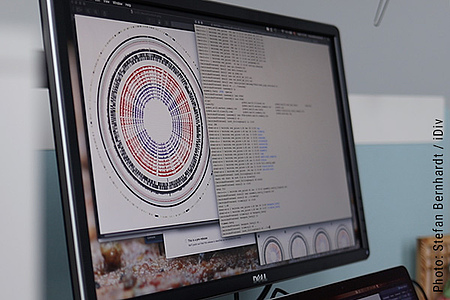
MetaGen (SU)
MetaGen support includes continuous, flexible support, which can be requested by the iDiv community ad hoc, as well as phases of focus on defined projects. Flexible support ranges from advice on software, statistics, data repositories or technology choices, set-up, maintenance and training on bioinformatics software and pipelines, development of custom software solutions for biodiversity research questions, as well as professionalization and training of early stage researchers.
luis.salcedo@ufz.de
PlantHub (SU)
PlantHub (SU)
PlantHub was founded as an initiative of 19 PIs and partners of iDiv. The main goal of PlantHub is to increase the use and visibility of
datasets and workflows that focus on plant biodiversity, its causes, changes, and impact on other environmental variables. The focus is on
projects and datasets based at iDiv and its partner institutions. On its LEARN page, PlantHub provides information about its partner projects, EXPLORE offers numerous interactive visualization options, and ANALYSE is a code library for working with the presented data in R and Python.
cwirth@uni-leipzig.de
Science-Policy Activites
iDiv’s science-policy activities support bodies and initiatives at the national and global scale and, thus, make sure that iDiv science reaches a broad audience and policy makers, in particular. iDiv Support Units (SU) and Strategic Projects (SP)
GEO BON
GEO BON’s mission is to improve the acquisition, coordination and delivery of biodiversity observations and related services to users including decision makers and the scientific community. It’s vision is a global biodiversity observation network that contributes to effective management policies for the world’s biodiversity and ecosystem services.
henrique.pereira@idiv.de
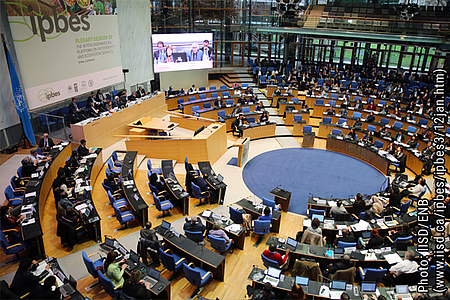
ipbes
IPBES provides policymakers with objective and reliable information about the state and development of biodiversity and ecosystem services. It was established in 2012 and is administered by the United Nations Environment Programme (UNEP). Its secretariat is in Bonn (Germany).
josef.settele@ufz.de
BioinformaticsHealth (SP)
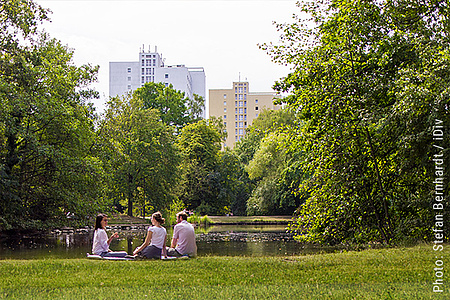
BioinformaticsHealth (SP)
To understand the microbial contribution to the health of individuals and finally of ecosystems, bioinformatics expertise is needed, to i) digest and combine especially meta-omics data, ii) understand interaction mechanisms, and iii) elucidate local and global patterns of molecular diversity. BioinformaticsHealth will make use of a molecular approach, which is needed to understand the full complexity of integrative biodiversity.
kirsten.kuesel@uni-jena.de
iCAP-BES (SP)

iCAP-BES (SP)
The aim of iCAP-BES is to promote a shift from identifying problems to designing and promoting solutions for improving farmland biodiversity, ecosystem services, and rural societies. Specifically, the project aims to a) assess the CAP’s impacts on nature and people, b) identify and evaluate cascading effects of the CAP in Europe and globally, and c) engaging in a close dialogue with policy makers and societal actors to enhance the uptake of existing and generated knowledge for a more sustainable CAP.
guy.peer@idiv.de
